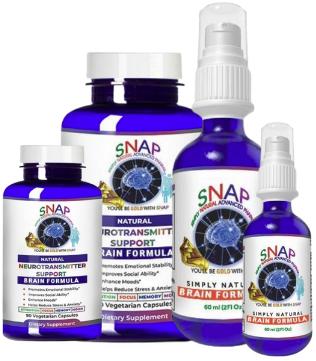Power of Vitamins for ADHD and ODD Treatments

Attention Deficit Hyperactivity Disorder
(ADHD) and Oppositional Defiant Disorder (ODD) can pose significant challenges
for those affected and their families. While traditional treatments often
involve medication and therapy, there's growing interest in exploring
alternative approaches, such as the role of vitamins in managing these
conditions. Before you consult the doctor or choose the supplements or brain
formulas that contain vitamins for ADHD and ODD,
you should know about the importance of all vitamins.
Omega-3
Fatty Acids
Found in fatty fish like salmon, flaxseeds,
and walnuts, omega-3 fatty acids are essential for brain health. Research
suggests that individuals with ADHD and ODD may have lower levels of omega-3s.
Supplementing with omega-3 fatty acids has shown promise in reducing ADHD
symptoms, improving focus, and managing impulsivity and aggression associated
with ODD.
Vitamin
D
Often referred to as the "sunshine
vitamin," vitamin D plays a crucial role in various bodily functions,
including brain health. Studies have linked vitamin D deficiency to an
increased risk of ADHD and ODD symptoms. Spending time outdoors and consuming
vitamin D-rich foods like fatty fish, fortified dairy products, and eggs can
help maintain adequate levels. Additionally, vitamin D supplementation may
benefit those with deficiencies.
Vitamin
B6
This vitamin is involved in
neurotransmitter synthesis and regulation, making it essential for optimal
brain function. Some studies suggest that children with ADHD may have lower levels
of vitamin B6. Supplementing with vitamin B6, either through diet or
supplements, has been associated with improvements in attention, behavior, and
mood regulation in individuals with ADHD and ODD.
Magnesium
Magnesium plays a vital role in hundreds of
biochemical reactions in the body, including those involved in brain function
and mood regulation. Research indicates that magnesium deficiency may
exacerbate symptoms of ADHD and ODD. Incorporating magnesium-rich foods like
leafy greens, nuts, seeds, and whole grains into the diet, or taking magnesium
supplements under the guidance of a healthcare professional, may help alleviate
symptoms.
Zinc
Zinc is an essential mineral involved in
various physiological processes, including neurotransmitter function and immune
system regulation. Studies have suggested a link between zinc deficiency and
ADHD symptoms. Supplementing with zinc has shown promise in improving
attention, hyperactivity, and impulsivity in individuals with ADHD. However,
it's crucial to maintain proper dosage, as excessive zinc intake can lead to
adverse effects.
Iron
Iron deficiency is common in children with
ADHD and ODD and may contribute to cognitive and behavioral symptoms. Iron is
necessary for the production of dopamine and serotonin, neurotransmitters
involved in mood regulation and attention. Ensuring an adequate intake of
iron-rich foods like lean meats, beans, fortified cereals, and dark leafy
greens can support cognitive function and behavior.
Comments